Sharing 18 – The Lay Marist Vocation
Download PDF: English | Español | Français | Português
Lay Marist Vocation
Caring for this gift
We are in the midst of the “Year of Marist Vocations“, which we are celebrating as a Global Charismatic Family throughout the Marist world and in which we are being invited to “care for and generate Marist life”. What does this invitation mean in the context of our Marist Europe and, more specifically, for the Marist Laity of this old continent?
‘Care for’ evokes the idea of quality time, time for encountering the God who dwells within us, for listening to what is stirring in our hearts, for “wasting time” with our brothers and sisters on life’s journey. In a special way, it refers to caring for someone when he or she is fragile or somehow at risk. As Lay Marists we are being called to care for those who are already in the twilight of their lives, our elderly, who are too often considered by European society as useless. We are being called to care for our children and young people, especially those who live in situations resulting from exclusion and discrimination, who are victims of abuse, lacking affection or caught up in a family breakdown. We are also being called, as we will read in the main article in this issue of the newsletter “Sharing” to care for the lives of migrants and refugees arriving in our countries in search of a place in the world where they can live with dignity and feel the warmth and light of a home.
“Generate’ brings to mind words such as giving, generosity, dedication, creativity, response… Mention of “generating Marist life” urges us to be witnesses of a meaningful life, grounded in the Gospel of Jesus, with a simple and brotherly lifestyle, like that of Mary and Father Champagnat. Our best efforts, projects, material resources or novel ideas are not enough these days to generate life. Rather, it is becoming increasingly necessary for people to come across living examples of meaningful, brotherly, gospel-based lives. In short, people displaying a vocation, on mission, with a deep spirituality and a “Marian” way of living and being Church.
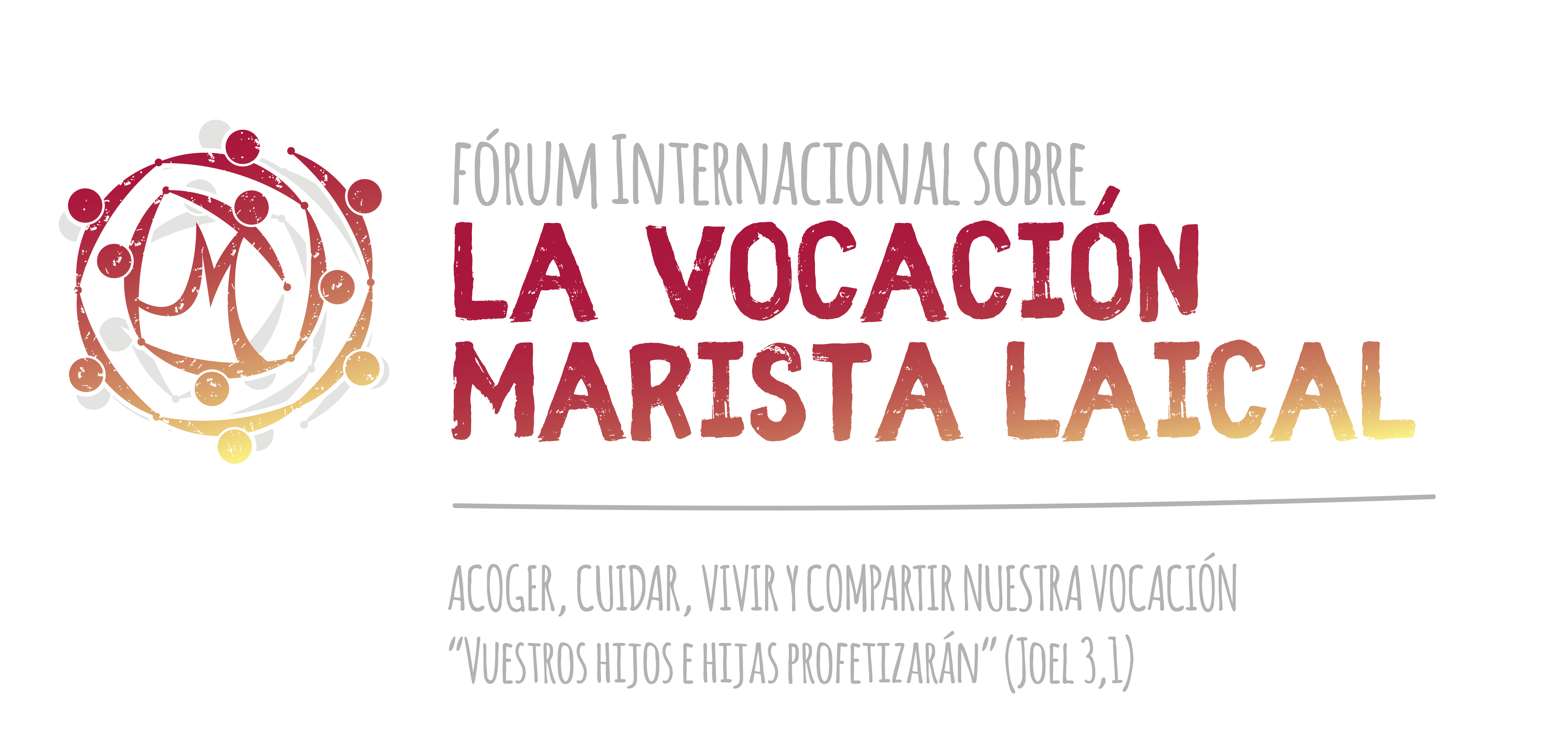
In the context of this Year of Marist Vocations, the “International Forum on the Lay Marist Vocation” (Rome, 4-11 November 2022) gives us the opportunity to WELCOME this vocation that the Spirit has spread in diverse ways throughout the Marist world; to continue to imagine ways, means, and pathways that help us CARE for this gift; to give expression to a way of LIVING that embodies our passion for this Marist way of being human and Christian, with compassion for our neighbours, both near and far; in short, to be committed to the present and to the future of the Marist charism because we care deeply about the children and young people of today and tomorrow and because we feel compelled to SHARE the gift of the vocation we have received which is wholly directed to our Mission.
This month’s issue has been prepared by Europe Region
The challenge to Lay Marists posed by migrants and refugees
Nacho Casamayor and José Antonio Paredes – Solidarity team of the Province of Mediterranea
What pains us as Marists of Champagnat? What pains you as a Christian? Provocative and personal questions, posed by Br Luis Carlos Gutiérrez (Vicar General) at the in-person formation session on Marist leadership in Porto Alegre. In this article we want to give a response which is probably shared by other Lay Marists.
It is presumptive on our part to put a response into the mouth of Saint Marcellin Champagnat, but we have no doubt that, if he was living today, the answer he would give to each one of us would be that he feels pained by the situation of injustice suffered by migrants and refugees, especially the most vulnerable groups.
Humanity has been on the move since the beginning of time and the causes of these movements are very diverse. Some people move to seek new economic opportunities or new employment prospects. Others seek to escape poverty or food insecurity caused by a multitude of socio-economic factors. Armed conflict, terrorism, persecution for reasons of religion, ideology, gender, sexual orientation or politics, and human rights abuses also trigger these migratory flows. In recent times, two scenarios have been added to this list of causes: the first is the adverse consequences of climate change or natural disasters (some of which may be linked to climate change) or other environmental factors; the second is the health and social crisis triggered by the Covid-19 pandemic. A combination of these reasons, in fact, have motivated many to move.
Nowadays, we are witnessing human migration at an unprecedented level. More people than ever are living in a country other than the one in which they were born, and the number of migrants is growing faster than the world’s population. The numbers are staggering: there are 89.3 million displaced persons in the world, of whom 27.1 million are refugees and 4.6 million are seeking political asylum in another country (UNHCR – UN Refugee Agency – 2021 report).
Faced with this phenomenon, which is not entirely new to us – e.g. the people of Israel lived as “slaves in a foreign land” – Pope Francis speaks to us loud and clear about what should be our stance and, at the same time, challenge: “How beautiful are those cities which overcome paralysing mistrust, integrate those who are different and make this very integration a new factor of development! How attractive are those cities which, even in their architectural design, are full of spaces which connect, relate and favour the recognition of others!” (Evangelii Gaudium 210). Francis stresses the importance of getting close to the harsh reality of these people “so as to provide services“, addressing their sufferings and needs, overcoming fears and prejudices, “so many prejudices that make us keep our distance from ‘others’ and often prevent us from approaching them as neighbours and serving them with Love.” This represents a major undertaking and at the same time a major challenge, since we cannot block our ears to this clear and constant call to welcome, accompany and include, to act together as a community, as builders of the Kingdom of God.
Welcome
“In the midst of this world, we feel a call to universal brotherhood and we Marists want to be the marian face of a poor and servant Church” (Br. Juan Carlos Fuertes – Marist Voices: Essays on Servant and Prophetic Leadership). Such a call invites us to be part of a welcoming Church in which we recognise our own vulnerability and yet who we are and can become when we are open to being questioned and challenged by the people we are welcoming.
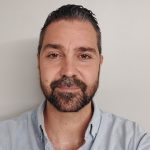
This invitation also implies that we take the initiative in such encounters as Mary did at the Visitation, with an attitude of outreach and a heartfelt show of affection.
Accompaniment
To stand alongside our suffering neighbours should never be understood from a top-down point of view, as was noted in the 4th Call of the XXII General Chapter: “This is a call that urges us … to empower those who have no voice, avoiding any paternalism; to be present in more significant ways among the children and young people on the margins of the world.”
The call, then, is not to struggle “on behalf of” or “because of”, nor to simply “sympathise”, but to dedicate ourselves as Lay Marists to offer our service and, in this space, to struggle “with” those who most need such service. Our mission must be born from an experience of encounter (Evangelii Gaudium, 220), confronting emerging realities head-on in an encounter with God, with ourselves and with others.

Inclusion
We make of a firm commitment to strive, not to create special places of welcome, but to be an inclusive welcome through the way we go about our daily lives in our ministries, communities, cities… Inclusion must be the final result of our journey, going through the two steps we have already described: a welcome based on humility and service as equals, and accompaniment “with” and alongside the most defenceless people in our unjust societies.
As Marists in Europe, we have already taken many steps and many concrete facilities have been built which, without a doubt, are very worthwhile and bring us closer to Champagnat’s dream. There are many social works and programmes that welcome, accompany and include all the people and social realities that come knocking at our door.
To conclude, we would like to go back to the question at the top… What pains you as a Marist? Champagnat was pained by situations of injustice that he saw and that pricked his conscience and moved him spiritually. As Marists we must embrace this same level of commitment in our lives, becoming beacons of hope in very real situations of exclusion, taking very concrete steps to relate to and welcome all ‘others’, supported by prayer and discernment. Be a Champagnat for today!
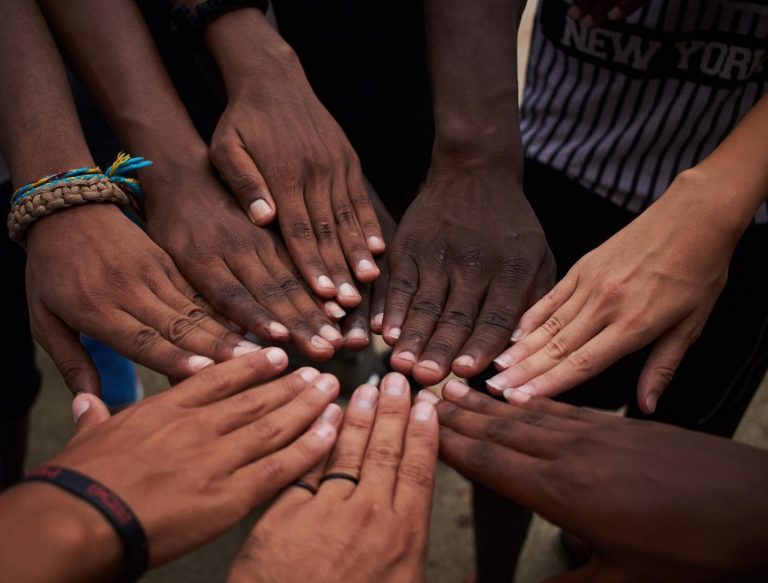
International Forum on the Lay Marist vocation
3rd Stage – 4 -11 november, 2022
Secretariat of Laity
We are about to begin, on the 4th November, the International Forum on the Lay Marist Vocation, in its international in-person phase. It will take place in Rome at the “Our Lord Mother of Mercy” house of spirituality.
There are 92 people attending the Forum: representatives of all the Administrative Units of the Institute and of the General Administration, the Brothers of the General Council, the directors of the Brothers Today Secretariat, plus the members of the extended Secretariat of the Laity. In addition, there will be several brothers and laypeople in support roles: facilitators, translators, decorations and celebration, secretarial assistance, communications… We will also have the invaluable help of the Brothers’ community of the General House and of the members of the different secretariats and teams of the General Administration.
Starting from the contributions made by each Administrative Unit, after the local and province phase of the Forum, and putting ourselves in an attitude of deep listening to the Spirit, we will address the 4 objectives of our reflection and discernment that will continue until the end of 2024. Our objectives are: 1. To deepen our understanding of the Marist vocation with particular emphasis on the lay Marist vocation. 2. To review and offer formation and mentoring processes and pathways for laypeople to grow in their vocation. 3. To reflect on and propose possible forms of bonding and belonging to the Marist charism. 4. To know, reflect, explore and propose possibilities of juridical structures (civil and canonical) for Marist laypeople.
From 4-11 November we will meet as a Global Charismatic Family to continue to envision new paths and make decisions regarding the future and vitality of our Marist charism, trying to discover how to live it with specifically lay characteristics and expression.
In the following link you will be able to access news, images, reflections etc. that will emerge during these days: 3rd Stage of the International Forum on the Lay Marist Vocation – Champagnat

Compostela Province
To educate, you have to first of all love
Inma Dueñas – Valladolid, Spain
I am a Marist by profession and vocation, a wife and mother of Marists, an infants teacher at the Marist school, Centro Cultural Vallisoletano, in Valladolid. From the moment I joined the staff I felt the need to get to know Marcellin Champagnat because I identified with his phrase “to educate you have to first of all love”. I have always kept this phrase in mind when working with the children. From there I have taken up various formation opportunities provided by the Province of Compostela which have helped me to grow as a person, a teacher and a lay Marist.

Doing the head and heart programme of Marist Life has led me to grow as a person: it has made me more in touch with myself, to know myself better, to realise that I have to dedicate time for myself, to take care of myself and thus be able to take better care of others.
The different processes and activities on offer each weekend are a complete range to grow spiritually: meditation and extended times of silence have helped me a lot and also helps with my work with students.
Doing this alongside brothers and laypeople has made me realise what a gift we receive when we share such moments and it reaffirms me in my being Marist.
The Marist Life programme is a real gift
María Ramos – Burgos, Spain
I have been working in the Administration of the Liceo Castilla Marist School in Burgos for the last 9 years. From the time I was a child, I have lived my faith within a group, a point of reference for me on my spiritual path and my growth as a person. However, with the passage of time and due to various circumstances such as living in different places, going to university, forming a family and losing connection with the group, I became a little lost spiritually. That is why the Marist Life programme has been such a gift for me at this time in my adult life.

The programme has led me to rediscover the spiritual, and the simple life of Marcellin. It has invited me to look deeper for the marvellous self that we all are. It has made me feel part of a large family, with my own mission of transmitting values (inculcating, receiving and discovering) both at school with students and colleagues, and in my family.
Being a twig on the family tree of the Marist family is an honour and a life commitment for me. I feel that with the sap I draw from its roots I will be able to bear valuable fruit because to feel that you are part of something is to let the life that is in it flow through you. For me, to be a lay Marist is to receive life and to give life in abundance.
L’Hermitage Province
A major change within
Jordi Cunillera – Catalunya
Between November 2019 and July 2021, I engaged in a process of formation and discernment of my lay Marist vocation. This meant participating in a head and heart Marist programme organised by the Province of L’Hermitage and, subsequently, in March 2022, my public commitment to the Marist charism.
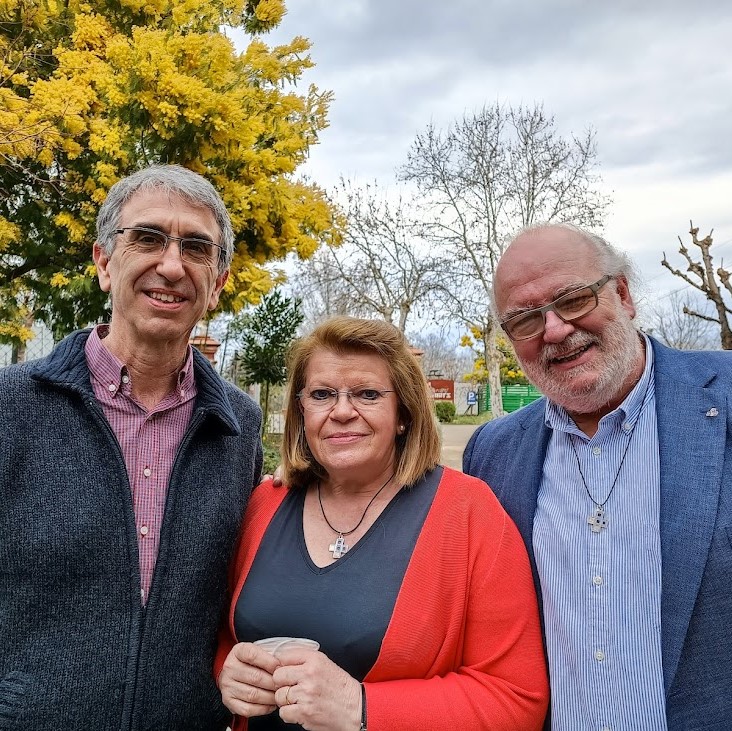
If you were to ask me what changes I have noticed in my life after I took this step, my answer would probably be: “maybe nothing apparent, but a major change within”. I think that externally no one may have noticed any change, since I still work in the same company, live in the same house, share my daily life with the same people. But studying and reflecting on the texts provided over the (almost) two years of the in-depth programme, being accompanied (a great experience; thank you for the accompaniment I received), making the request for commitment to the Marist charism, all this helped me to look within, to give answers to questions that perhaps I had never asked myself before, to grow as a Christian and a Marist, to confirm that this is how I want to live. This has made me very happy, even if externally no change can be seen.
Making the Kingdom of God present
Dolores Comas – Catalunya
Following the in-depth programme on Marist life and making a public commitment to the Marist charism has helped me to rethink the core of the charism bequeathed to us by Father Marcellin, which is to love others, as the Brothers do, in a simple, kind, helpful, gentle way, in the style of Mary; this is exactly what Jesus tells us to do. The conviction has also grown in me that as a Christian I am called to make the Kingdom of God present. How? The answer is the same, by loving others.
I live this out as a journey of personal growth. Listening to the Word and contemplative prayer keep my yearning for God alive. I also feel the need to walk in community. My companions on the way are a model, a mirror, like Moses and the Prophets, for me. They centre me and help me not to get lost. I love them and I feel loved.
I saw my public commitment as an opportunity, as a natural step forward.
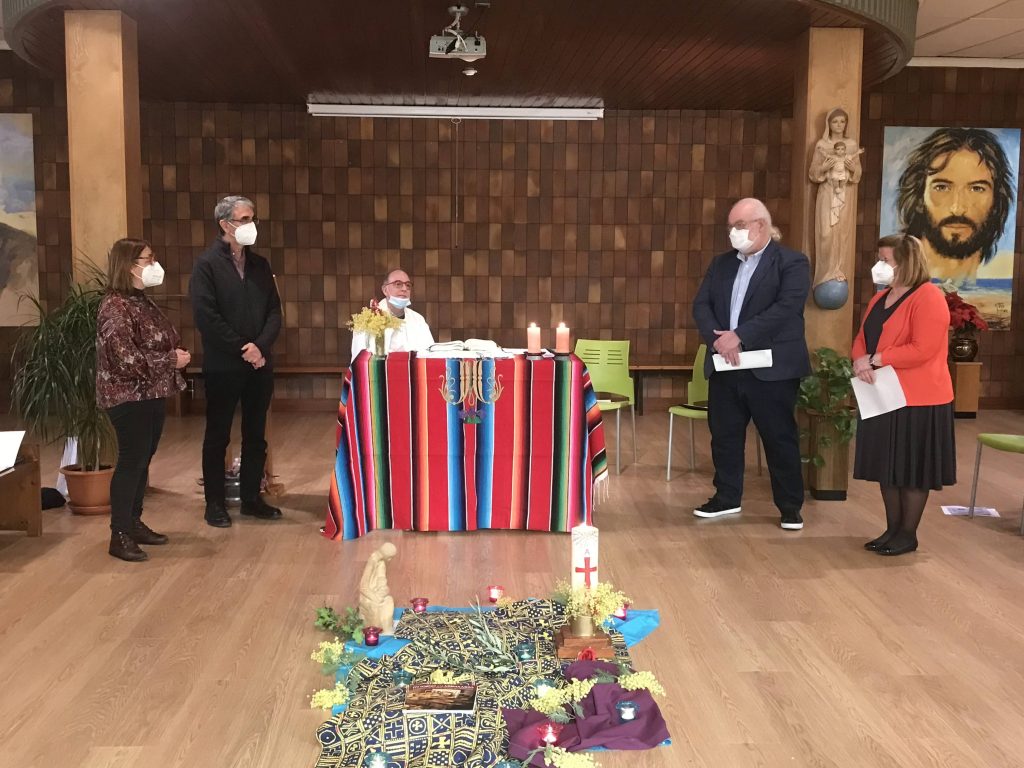
Mediterranea Province
Serving others
José Mª Albalá – Cordoba, Spain.
Who among us, at some point in our lives, has not felt that our lives can be compared to riding a motorbike? We lead such an intense pace of life that we need to stop frequently in our daily lives to think about whether we are headed in the right direction.
This is how I have approached the opportunity I have been given for vocational discernment and personal accompaniment.

It is a process FOCUSSED ON ME… It sounds selfish… Something FOR ME. But it is quite the opposite in fact. It is a process that is forcing me to stop at various moments in my life to interiorise and reflect on whether my day-to-day life is geared towards serving others.
This programme is touching all areas of my life; nothing remains unaffected: my spirituality, my vocation, my mission, my sense of brotherhood.
The truth is that it has not been easy for me. I find it challenging and that is good. It is making me stronger. But most of all it is bringing me closer to God and closer to others, to my companions, to my neighbours.
But that’s not all. I have a MENTOR who walks beside me. Someone who accompanies me, who listens to me, who understands me, who encourages me, who trusts me and, above all, who is being God’s instrument in my life. Someone who makes me feel that I am on the WAY and belong to a COMMUNITY.
To finish, I thank God for having given me this opportunity to continue to grow as a lay Marist. I thank the Father for providing me with this experience of DISCERNMENT that encourages me to continue to live out Marcellin’s dream.
I am a Lay Marist
María José Gimeno – Valencia, Spain.
I am a Lay Marist: this is how I have been proudly introducing myself for some time now, knowing that my vocation in the Church is to be a Christian at the service of “God’s favourites”, like Jesus, seeing the world as Marcellin did, and reproducing the gaze of our Good Mother.
Once I was clear about who I was, everything became easier. Putting a name to what I feel, to what I am called to be, to what resonates within me, has allowed me to make decisions from the love and peace of mind of knowing that I am responding to the calls that God is making to me.
I am convinced that, if I had not started the vocational discernment journey with personal accompaniment, it would have been much more difficult to “put a name on myself”. The programme and the accompaniment (it is vital that they go hand in hand) have helped me to discern moments of my journey that I had not considered important, to shed light on many shadows and to install beacons of hope and light for when I do not know the best way forward.

The programme and accompaniment allowed me to search within myself, to find moments of stillness to discern, to take heed, to say that I am… a Lay Marist.
Bonding to the Marist charism in the Province of Ibérica
On October 15, in Toledo, the Marist family had a very special Marist feast: the celebration of the attachment to the Marist charism of four very dear and significant persons who, after a process of accompaniment, and after the pandemic, they have been able to proclaim their faith in this way of life and to be Christian in Mary’s and Marcellin’s way
María José, Teo, Tony, and Pablo were already Marist references in their surroundings of Toledo, Navalmoral de la Mata, and Talavera. Their commitment expressed in the formula of attachment was made before a large community of brothers and lay people of the Iberian Province, and has confirmed their willingness to continue to be so.
The well-prepared celebration, the love, and attention of the community of the brothers of Toledo, the quality of the musicians, the serene emotion of the protagonists, the closeness of the priest who presided over the Eucharist, the joy of this commitment have made those present live a beautiful, hopeful, and unforgettable experience.
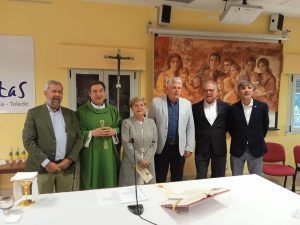
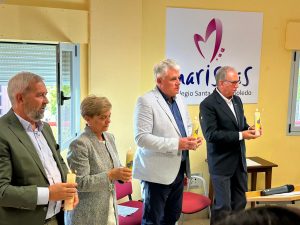
The protagonists talk about the process up to the attachment
- The moment of invitation to the path of Marist laity was a gift to me. For a long time I had already felt and breathed the spirit of the Church and the Marist life, but making this decision allowed me to be free and to feel that I was making the right choice for the future of my life.
The accompaniment has been very positive: I have learned to find myself, to pray daily, personally, reflectively, and with the courage to share with my companion everything I felt, strong feelings, and questions that have helped me to discern where I am heading. I have received confidence, closeness, listening skills, and security, helping me to discover clearly and concretely the meaning of the path I want to follow. “The accompaniment has been a gift from the Holy Spirit”, an important experience in my life, which has helped me in a personal and spiritual way (María José).
- The accompaniment has been a fundamental and essential part to carry out the bonding itinerary. The cards are well thought out and provide the basis for the accompaniment, which is fundamental. El momento del encuentro con el acompañante (H. Samuel) me suponía al principio algo de inquietud, pero una vez que llegaba me tranquilizaba y empezaba a hablar. El Hermano escuchaba, y entonces brotaban sentimientos, ideas y vivencias que con solo la ficha no habrían surgido. Then came the suggestion, the comment, the words of encouragement, or clarification of any doubt. This moment was enriching, and practical and gave me the confidence to continue with the itinerary and to discover the mission and meaning of the Bonding. I value it very positively (Teo).
- The whole process has been a blessing from God. I soon understood that it was a proposal and a personal commitment, which goes beyond my relationship and friendship with the brothers, professors, and teachers. Chema’s accompaniment has been fundamental. His listening, comments, and advice in response to my doubts and insecurities… helped me to clear the path. The cards have been a very valid instrument, they have helped me to reflect, to pray, to learn… until the big day arrived, the linking (Pablo).
- This process followed until reaching the attachment, what has helped me the most has been the accompaniment. The accompaniment and the cards have helped me to put my ideas in order, canalize my feelings and discover all the components of my vocation as a lay Marist. The companion has acted as a mirror where I have been able to discover and see the love of God and his step in my life, to be able to share from the heart what I have been living, the resistances I have found in me and how to face them (Tony).
